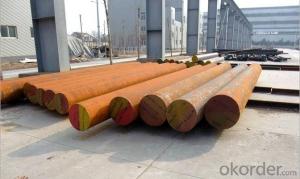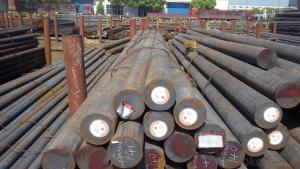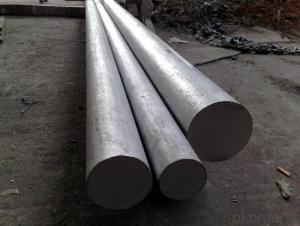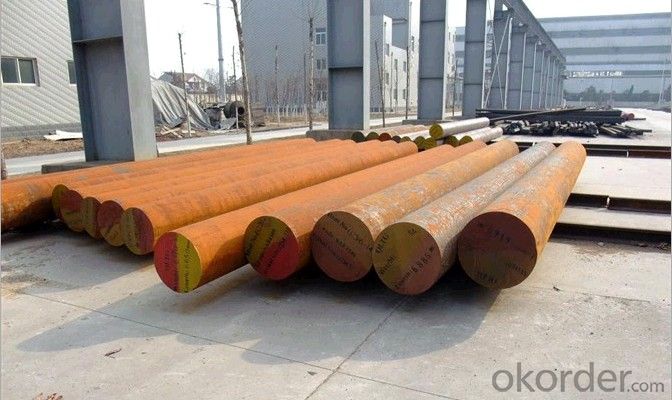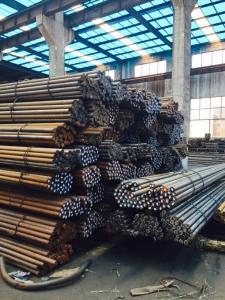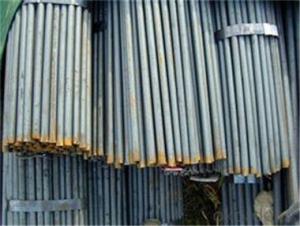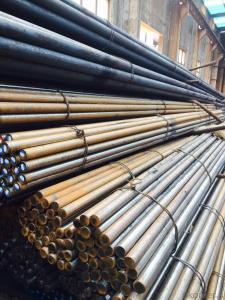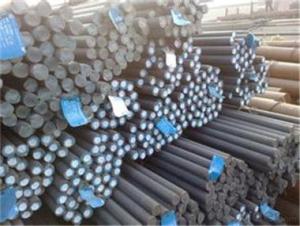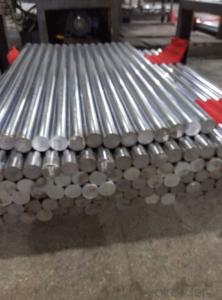Forged C45 Carbon Steel Round Bars Steel Bar
- Loading Port:
- China main port
- Payment Terms:
- TT OR LC
- Min Order Qty:
- 30 m.t.
- Supply Capability:
- 10000 m.t./month
OKorder Service Pledge
OKorder Financial Service
You Might Also Like
Specification
Forged C45 Carbon Steel Round Bars Steel Bar
Product Information:
Stock available in annealed and QT condition.
No MOQ for order.
Delivery 7-10 days.
Good tolerance according the the OD.
Staightness could meet 1mm/M per requirement.
Detailed Information:
1, Standard: GB, ASTM, AISI, SAE, DIN, JIS, EN
2, Produce Process: smelt iron - EAF smelt billet - ESR smelt billet - hot rolled or forged to get the steel round bar and plate
3, Heat Treatment: annealing, normalizing, tempering, quenching
4, Surface Treatment: Black, Polished, Galvanized
The picture of the products
5, Quality Assurance: We accept third party inspection for all orders.
You can ask testing organizations such as SGS, BV, etc. to test our products before shipping.
Product Overviews:
| Product Name | Typical Grades | Diameter(mm) | Standard adopted |
| Carbon Steel | 20 (1020/S20C/C22) | Ø16-Ø300 | GB/SAE/JIS/DIN |
| 40 (1040/S40C/C40) | |||
| 45 (1045/S45C/C45) | |||
| Bearing Steel | GCr9 (51100/SUJ1) | Ø12-Ø250 | |
| GCr15 (52100/SUJ2/100Gr6) | |||
| GCr9SiMn (A485-Gr.1/SUJ3) | |||
| Cr-Mo Steel | 20Cr (5120/SCr420H/20Cr4) | Ø12-Ø250 | |
| 40Cr (5140/SCr440/41Cr4) | |||
| 42CrMo(4140/SCM440/42CrMo4) | |||
| Gear Steel | 20CrNiMo | Ø16-Ø600 | |
| 20CrMn(5115/SMnC420/20MnCr5) | |||
| 20CrNiMo(8620/SNCM220/20CrMiMo2) |
Product Show:

Our Advantages:
· Industry experience over 20 years.
· Shipment of goods -More than 70 countries worldwide.
· The most convenient transport and prompt delivery.
· Competitive price with best service.
· High technical production line with top quality products.
· High reputation based on best quality products.
With our experienced, enthusiastic and dynamic staffs, we assure to bring you the products with best quality, reasonable prices and good after-sales services under the motto: Friends First, Business After.
Communication, Experience, Expertise and Best efforts are our Promises to you.
- Q: What are the advantages of using special steel in various industries?
- Special steel offers several advantages in various industries. Firstly, it has superior strength and durability, making it ideal for applications that require high resistance to wear, impact, and corrosion. This enables the production of longer-lasting and more reliable components, reducing maintenance and replacement costs. Additionally, special steel can be tailored to meet specific requirements, such as temperature resistance or magnetic properties, allowing for customization in different industries. Furthermore, its excellent machinability and weldability make it easier to work with and shape into complex forms, enhancing design flexibility. Finally, special steel's ability to withstand extreme conditions and harsh environments makes it ideal for industries like aerospace, automotive, construction, energy, and manufacturing. Overall, the use of special steel enhances performance, efficiency, and longevity in various industrial applications.
- Q: Can special steel be used for making food processing equipment?
- Food processing equipment can indeed be made using special steel. Known as stainless steel, this type of steel is widely utilized in the food processing industry due to its distinctive characteristics. Stainless steel, being non-reactive, does not interact with food or change its taste, smell, or appearance. Furthermore, it is resistant to corrosion, a crucial feature in safeguarding against contamination and ensuring food safety. Additionally, special steel is long-lasting, easy to clean, and possesses a smooth surface that hinders bacterial growth. These attributes render it an excellent choice for producing food processing equipment such as mixing tanks, conveyors, cutting tools, and storage containers.
- Q: What are the properties of tungsten alloys?
- Tungsten alloys possess high density, exceptional strength, and excellent heat resistance. They exhibit excellent corrosion resistance, good electrical conductivity, and are highly resistant to wear and deformation. Additionally, tungsten alloys have a high melting point, making them suitable for applications in extreme environments such as aerospace, defense, and medical industries.
- Q: Can special steel be used in aerospace turbine components?
- Aerospace turbine components, like blades, vanes, and disks, need strong materials to withstand tough conditions. Special steel, also known as high-performance alloy steel, fits the bill. It has excellent mechanical properties, like high strength, hardness, and temperature resistance. These qualities make it perfect for aerospace turbine components, which face extreme temperatures, pressures, and stress. Jet engines rely on turbine components to work properly, so they need materials that can handle the tough conditions. Special steel alloys, like nickel-based superalloys, are commonly used because they can maintain their strength and integrity at high temperatures. Plus, special steel is lightweight but strong, so it helps make durable yet light turbine components. This improves the efficiency and performance of aerospace systems. Special steel alloys also resist corrosion, oxidation, and fatigue, which are crucial for the long-term reliability and safety of turbine components. These materials go through rigorous testing and certification to meet aviation industry standards. In conclusion, special steel is a great choice for aerospace turbine components. Its exceptional mechanical properties and resistance to extreme conditions make it reliable and safe. It plays a vital role in ensuring the efficiency and safety of turbine systems in aerospace applications.
- Q: How does copper influence the characteristics of special steel?
- Copper has a significant influence on the characteristics of special steel due to its unique properties and its role as an alloying element. When added to steel in small amounts, copper can enhance its strength, hardness, and resistance to corrosion. One of the key benefits of copper in special steel is its ability to improve the steel's mechanical properties. Copper increases the strength and hardness of steel, making it more suitable for applications that require high tensile strength and durability. This is particularly important in industries such as construction, automotive, and aerospace, where strong and durable steel is essential. Furthermore, copper also enhances the steel's resistance to corrosion. It forms a protective oxide layer on the surface of the steel, preventing the formation of rust and other forms of corrosion. This makes copper-infused steel ideal for use in harsh environments or applications where exposure to moisture or corrosive substances is common. Additionally, copper can improve the machinability of special steel. It acts as a lubricant during the machining process, reducing friction and heat generation. This results in improved tool life, reduced energy consumption, and enhanced productivity. In summary, the addition of copper to special steel can significantly influence its characteristics. It enhances the steel's strength, hardness, and corrosion resistance, making it more suitable for demanding applications. Moreover, copper also improves the machinability of steel, leading to increased productivity and cost-effectiveness.
- Q: Can special steel be used for making aerospace components?
- Yes, special steel can be used for making aerospace components. Special steel, also known as aerospace steel or aircraft steel, is specifically designed to meet the high demands and stringent requirements of the aerospace industry. It possesses exceptional strength, durability, and heat resistance properties, which are crucial for withstanding the extreme conditions experienced by aircraft components during flight. Aerospace components, such as landing gear, engine parts, fasteners, and structural elements, often require materials that can maintain their integrity under high temperatures, stress, and corrosive environments. Special steel alloys are developed to have excellent mechanical properties, including high tensile strength, fracture toughness, and resistance to fatigue, creep, and corrosion. These properties make them suitable for critical aerospace applications where safety and reliability are of utmost importance. Furthermore, special steel can be tailored to specific requirements, such as weight reduction, improved fuel efficiency, and enhanced performance. Through advanced alloying techniques and heat treatments, aerospace steel can be engineered to have desirable characteristics like increased hardness, wear resistance, and dimensional stability. This allows for the production of lighter and more efficient aerospace components without compromising on strength or safety. In conclusion, special steel is a preferred material for making aerospace components due to its exceptional mechanical properties, heat resistance, and corrosion resistance. Its ability to withstand extreme conditions and be customized to specific requirements makes it an ideal choice for manufacturing critical parts used in the aerospace industry.
- Q: What are the future trends and innovations expected in special steel production?
- The special steel production industry is anticipated to undergo significant changes in the future. Several trends and innovations will shape this industry, and the following key areas are expected to see advancements: 1. Advanced Manufacturing Techniques: Special steel manufacturers will likely adopt advanced manufacturing techniques, such as additive manufacturing (3D printing) and digitalization. These technologies will facilitate the production of complex geometries, minimize waste, and allow for customization of special steel products. 2. Sustainable Production: Due to growing environmental concerns, there will be a focus on sustainable production methods in the special steel industry. This will involve adopting energy-efficient processes, recycling and reusing materials, and reducing the carbon footprint of steel production. 3. High-Strength and Lightweight Alloys: The demand for lightweight materials in sectors like automotive and aerospace will drive special steel production towards developing high-strength and lightweight alloys. These alloys will enhance performance while reducing component weight, leading to improved fuel efficiency and sustainability. 4. Nanotechnology and Microstructural Engineering: Nanotechnology and microstructural engineering will enhance the properties of special steels. By manipulating materials at the nanoscale, manufacturers can improve strength, toughness, corrosion resistance, and other characteristics. 5. Enhanced Surface Treatments: Advancements in surface treatments, such as coatings, will improve the performance and longevity of special steel products. Innovative surface treatments will offer increased resistance to wear, corrosion, and heat, expanding the range of applications for special steels. 6. Digitalization and Data Analytics: Special steel production will undergo a revolution with the integration of digital technologies and data analytics. Smart factories with interconnected systems will enable real-time monitoring, predictive maintenance, and improved quality control, resulting in higher productivity and efficiency. 7. Automation and Robotics: Automation and robotics will continue to play a vital role in special steel production, optimizing productivity, reducing human errors, and improving worker safety. This will enhance overall operational efficiency. 8. Industry 4.0 Integration: The special steel industry will embrace Industry 4.0 principles, including the Internet of Things (IoT) and artificial intelligence (AI). These technologies will enable seamless connectivity, intelligent decision-making, and predictive analysis, leading to improved productivity, cost-effectiveness, and competitiveness. In conclusion, the future of special steel production will be shaped by advancements in manufacturing techniques, sustainable practices, material engineering, digitalization, and automation. These innovations will not only enhance the performance and quality of special steel products but also contribute to a more sustainable and efficient industry.
- Q: What are the different surface hardening grades of special steel?
- There are several different surface hardening grades of special steel, each designed to provide specific characteristics and properties. Some of the commonly used grades include: 1. Case-hardening steels: These grades are typically low carbon steels that are designed to develop a hard outer layer, or case, while maintaining a softer core. This is achieved through processes like carburizing or nitriding, which introduce carbon or nitrogen into the surface of the steel. Case-hardening steels are often used in applications where wear resistance and toughness are required. 2. Tool steels: These grades are specifically designed for use in cutting, forming, and shaping tools. Tool steels are known for their high hardness, resistance to wear, and ability to retain their cutting edge even at elevated temperatures. Various types of tool steels are available, such as high-speed steel (HSS), hot work steel, cold work steel, and plastic mold steel, each suitable for specific applications. 3. Stainless steels: These grades of special steel contain a minimum of 10.5% chromium, which provides excellent corrosion resistance. Stainless steels can be hardened through processes like precipitation hardening or martensitic transformation. They are commonly used in industries such as food processing, chemical, and medical, where resistance to corrosion and high temperatures are crucial. 4. High-strength steels: These grades are designed to provide exceptional strength and toughness. They often contain alloying elements like manganese, chromium, or nickel to enhance their mechanical properties. High-strength steels are commonly used in structural applications, automotive components, and heavy machinery. 5. Maraging steels: These grades of special steel are known for their high strength, toughness, and excellent resistance to fracture. Maraging steels achieve their properties through a unique aging process, which involves a precipitation-hardening treatment. They find applications in aerospace, defense, and tooling industries. 6. Bearing steels: These grades are specifically formulated to provide excellent wear resistance and durability for use in bearing applications. Bearing steels often contain alloying elements like chromium, molybdenum, and vanadium to enhance their mechanical properties and resistance to fatigue. These are just a few examples of the different surface hardening grades of special steel. Each grade offers unique properties and characteristics, allowing for a wide range of applications in various industries.
- Q: How is special steel used in the production of aircraft components?
- Special steel is used in the production of aircraft components due to its exceptional strength, durability, and resistance to corrosion. It is commonly utilized in critical areas such as engine components, landing gear, and structural parts where high performance and reliability are essential. The special properties of steel allow for the creation of lightweight yet strong components, ensuring the safety and efficiency of aircraft operations.
- Q: What are the different applications of stainless special steel?
- Stainless special steel finds various applications in industries like construction, automotive, aerospace, and medical. It is commonly used in the production of surgical instruments, chemical processing equipment, heat exchangers, and food processing machinery. Its corrosion resistance, strength, and ability to withstand high temperatures make it an ideal choice for applications where durability and hygiene are essential.
Send your message to us
Forged C45 Carbon Steel Round Bars Steel Bar
- Loading Port:
- China main port
- Payment Terms:
- TT OR LC
- Min Order Qty:
- 30 m.t.
- Supply Capability:
- 10000 m.t./month
OKorder Service Pledge
OKorder Financial Service
Similar products
Hot products
Hot Searches
Related keywords
